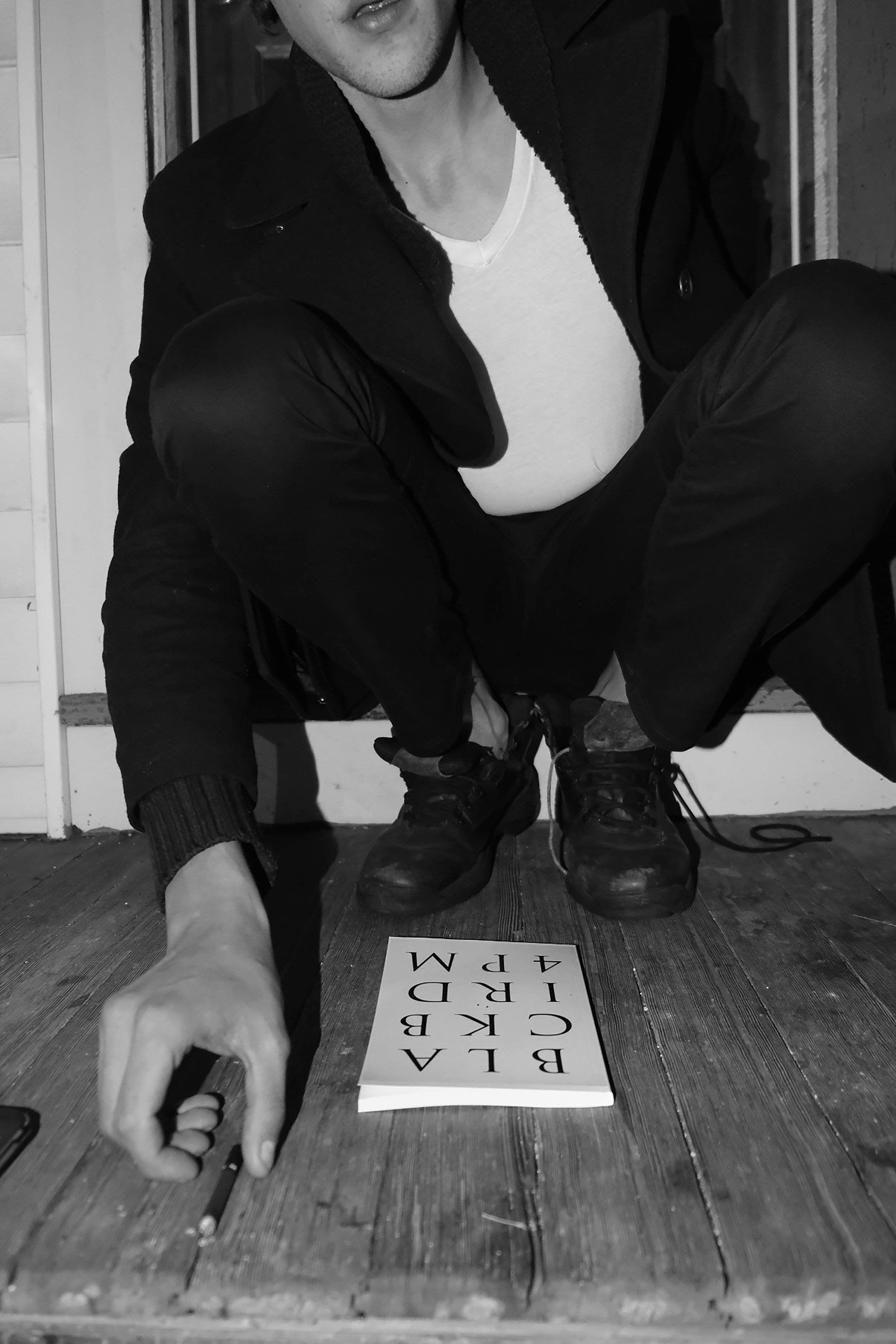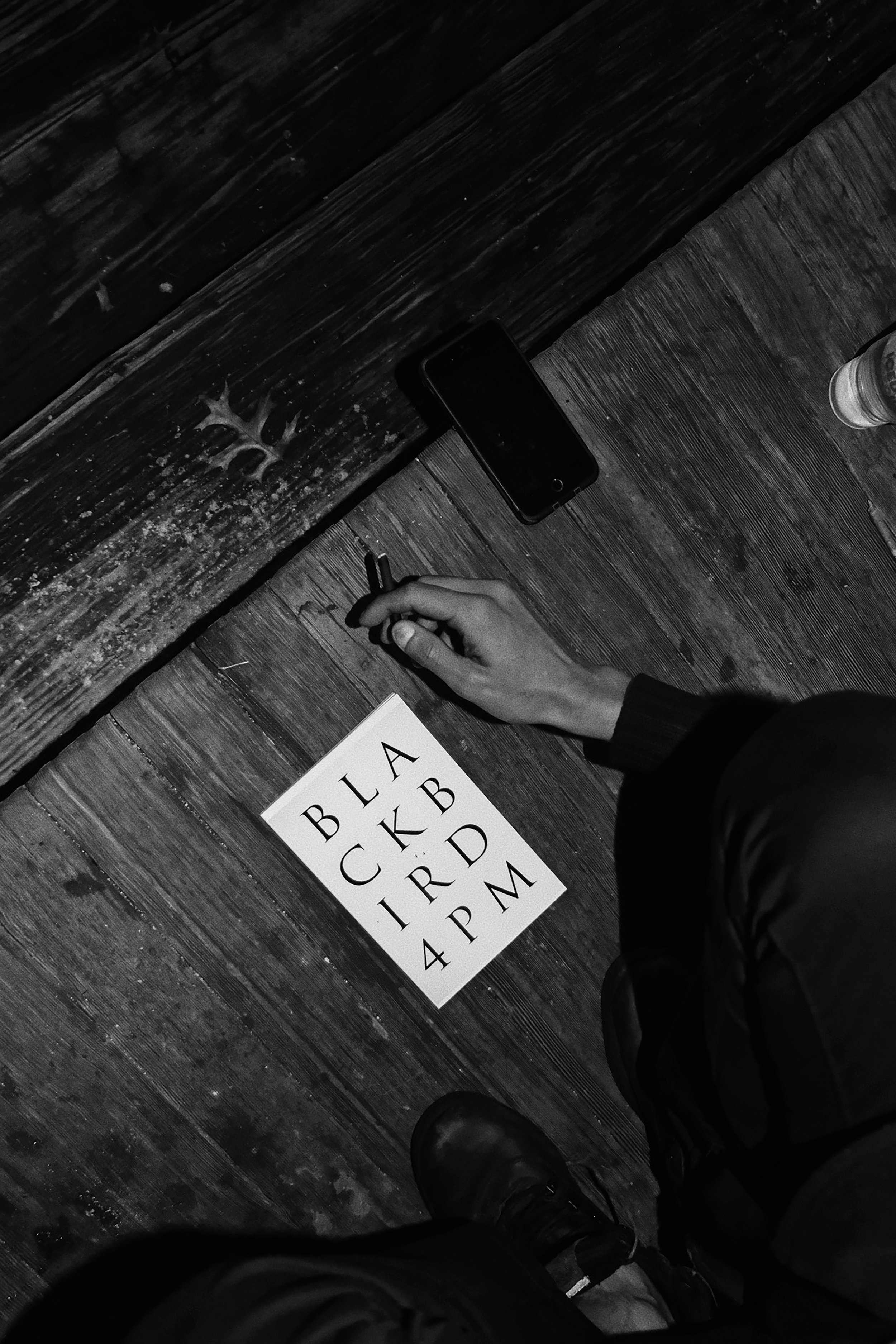brett maddux's blackbird, 4pm
The blackbird is always watching. brett a. maddux channels a more poignant worldview of the titular creature of his latest, blackbird 4pm.
Written by Dan Osto
Photography by Eaze & Michael Sisko
For Hartford poet brett a. maddux, the blackbird is always watching. Whether we are conscious of its presence, the world we merely inhabit is a larger aviary, always under the omnipresent eye of Turdus merula.
While this vision may strike some as ominous or apocalyptic in tone, maddux has found divine and domestic inspiration, channeling a more poignant worldview of the titular creature of his newest book, blackbird, 4pm.
Since the release of his first book, Regent, maddux has kept busy writing poetry, collaborating with Silk House Publishing to manage his own book label, WhichIsWhyPress, and shooting characteristically monochromatic photography through his popular DinersofConnecticut social media account, previously featured in Aislin.
It is enthralling to see different modes of maddux throughout all of these outlets, and even more interesting to watch as they all converge. All in the past few months, maddux started his book label, released his second collection of poetry, and presented a highly visual campaign of the 2018 Connecticut Democratic candidates, Jahana Hayes, Chris Murphy, and Ned Lamont via DinersofConnecticut--between all of the dining, of course.
He also recites his work at Greater Hartford subcultural events and indie rock basement shows alike. Witnessing all of these channels grow concurrently, with each monochromatic visual, each line of vociferous wordplay, each free floating cigarette, reflects of a more subtle, multifaceted vision from the poet behind the camera lens.
Following all this, we recently spoke with maddux about his endeavors and his second book blackbird, 4pm, which just came out this past November.
The poet writes on his release:
A COLLECTION OF POEMS ABOUT THE WAYS WE BUILD NEW FAMILIES, THE WAYS WE LOVE, THE WAYS WE DIE, THE WAY A CITY CAN BECOME MORE THAN THAT. TENDERNESS, RIGHT HERE ON THIS EARTH. FROM THE AUTHOR OF REGENT.
As indicated above, blackbird, 4pm resonates on numerous levels, both personal and cosmopolitan, internally, and environmentally. Through the title, which both references the titular bird and a particular time of day, maddux centers these observations through a nuanced lens, permeated by the abstraction of this mysterious creature and the cyclical passing of time.
Mostly written between the seasonally oppositional months of December 2017 and July 2018, blackbird is imbued with the reflections of a turbulent era, and a tumultuous life. In addition, it features a highly temporal nature, which spotlights a particular sequence beyond its prologue and epilogue.
photography by Eaze
“The blackbird in ‘memphis’ is a different blackbird than the one in ‘what children know,’ in every meaningful thematic sense, but it is representative of the same idea: for better or worse, everything returns.”
The collection starts off on a relatively tranquil note, something which seems ambivalently peppered throughout its subsequent morose wordplay and observations of society: “prologue” revels in the earliest lines of “the good hour” of our daily existence, a time left noticeably unspecific in a book which makes a point to define them.
Instead, this “good hour” is presumably the earliest hours of the day: separated from the conscious world, void of people and their strife.
This peaceful introduction is then jarred:
Then the birds come
Triggered by their presence, the world starts to sputter awake: “truth crawls out from under the blanket of the night,” and a morning fog of a daily drive to work is the last defense of epistemological ambiguity before reality kicks in. The juxtaposition of this prologue with the bloody and political “america, 12am” follows the humble morning commute like a kick in the teeth. Is the presence of the birds what defines the “good hour”? Or the harbinger of what comes after?
Looking at the first appearance of the blackbird in its titular poem, its presence appears more comforting:
& in dreams
the people
i love
do not
leave me
i know
& in dreams
their souls
are blackbirds
repeating
i know
maddux has revealed insight on his creation concerning the cyclical and relative nature of the blackbird:
It is the ways we repeat mistakes, the way love echoes through our lives, the wars our nation starts and never ends. It is about this broader idea that grief is this way too - grief pulses through your life in these sudden, unexpected ways, & you continue to feel that in passing moments as time goes by... you feel it less, & some days you might not feel it at all.
But every once in awhile, there it is. Everything is this way. & so to the extent this book is describing a day, it is also telling a story about all of these themes repeating. The blackbird in ‘memphis’ is a different blackbird than the one in ‘what children know,’ in every meaningful thematic sense, but it is representative of the same idea: for better or worse, everything returns. If you pay attention, you are surrounded by all of the things you love & challenged by all the things that hurt, & are called to be more present in the lives of the people you care about.
Photography by Michael Sisko
“Despite this deep-seated sorrow of regret and loss of human connection, there are glimmers of peace and hope that are carried on the wings of our ever-watching avifauna. As the loss of family likely drives the more intense emotions in the novel, so does the desire to create a new one.”
Even knowing this, the blackbird remains a fascinatingly elusive figure throughout the book. Many poems in the collection begin with their primary concerns, whether it be ruminations of death, God, or social injustice, only to be cast in the shadow of this avian apparition.
When the blackbird does appear, it evokes the cyclical nature of the content of each poem, often in some kind of emotionally rousing way. Looking again at the title poem, it expands the symbol beyond its tangible presence:
& all neighbors
come gather
around me
& wait to see
what it means
to return
look
son
yes
that is a blackbird
& yes
that is one too
& each is your mother
or sister or brother
& they’re all waiting
for you
to be
blackbird
too
Here, maddux draws a direct connection between the blackbird and family, suggesting it is not only the blackbird that returns to our lives, but any significant part of our lives will continue to resurface. The cyclical nature of the blackbird is not only found in the creature, but throughout all the topics in the book: family, friends, God, death, etc.
Like maddux suggests, they all reappear throughout our lives, whether we are conscious of it or not. In a way, they are all the blackbird, and if we return to the ones we love, we can be a blackbird too.
As indicated above, the presence of family hangs heavy in maddux’s work. Oftentimes, the poems which appear to focus on other topics still have strong familial ties, as they contain recurring references to mothers, fathers, uncles, and siblings, peppered throughout the diction of the text.
However, it is the poems which directly address the family that reveal insights into maddux’s focus on the importance of being more present in the lives of the people one cares about.
Two poems, “as they put electricity in my mother’s brain” and “to a dying uncle” are particularly telling:
momma I’m sorry
I was not there
to hold your hand
& the way
she laughed at me
& meant it
Tenderly
said I reminded her
of a joke
she’d once heard~~~
hey rick
it’s sunday
& you won’t
live to see
the next one
& i’m sorry
I never told you
how much I loved you
when you
could
hear me
By highlighting this personal loss of familial connection, these poems contribute to a sense of anxiety (towards death) and desire (to appreciate the ephemeral beauty of life) through the rest of blackbird, 4pm.
Photography by Michael Sisko
“When the blackbird arrives in Hartford, in a way, it serves as not only a reminder of its potential, but a guardian and a beacon of positivity.”
Despite this deep-seated sorrow of regret and loss of human connection, there are glimmers of peace and hope that are carried on the wings of our ever-watching avifauna. As the loss of family likely drives the more intense emotions in the book, so does the desire to create a new one.
Perhaps one of the less expected places to see this is in the blackbird standout “to die in hartford,” a surprisingly sentimental ode to young love in Connecticut’s often misunderstood and unfairly maligned capital city. In a time where pessimism and apocalyptic tones has surrounded the city of Hartford, maddux channels an unironic hope for the future, crafting a torrent of lovestruck aspirations:
to die in hartford
is to at last
find the front yard
grown with tall grass,
the raptured scent
of your morning breath
still rattling in my chest.
it will
go on
like this
forever
The poem resonates on numerous levels: not only personally, to maddux, and those who already live in and love Hartford, but also to a new generation which looks and sees hope in the future of the capital city: a place to grow and thrive. When the blackbird arrives in Hartford, in a way, it serves as not only a reminder of its potential, but a guardian and a beacon of positivity.
Death may show its face in many ways in blackbird, 4pm, but “to die in hartford” is a paean to life and family. Like the old saying goes, “home is where the heart is”, and Hartford has it.
Photography by Eaze
Dan Osto is an English teacher and owner at CT Scramble Music Blog. Order a copy of brett maddux’s blackbird, 4pm through whichiswhypress.com.






